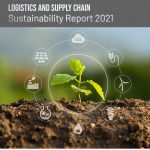
A global survey of logistics and supply chain executives has found that there is still very little consensus on which alternative power system will replace diesel for the heavy duty truck sector over the coming years.
The survey, contained in the Logistics and Supply Chain Sustainability Report 2021, published jointly by Ti Insight and the Foundation for Future Supply Chain, found that 44% of respondents favoured hydrogen, 34% Liquid Natural Gas (LNG) and just under a fifth electric.
There was far more clarity about the future of the light commercial van sector. Almost four fifths (77%) said that battery electric would gain the widest adoption followed a long way behind by LNG and hydrogen (12% and 11% respectively).
When asked what the biggest barriers were to adopting new e-fuels, respondents returned a variety of issues with the lack of charging network being the most frequently cited. Cost of new vehicle acquisition and the range of electric batteries were also regularly cited.
It also seems that a sizeable minority believes that government targets to phase out the use of fossil fuels in engines are unrealistic. Over a third of executives were skeptical of plans to ban petrol and diesel engines by 2040 (many countries have earlier deadlines) suggesting that there will need to be considerable progress in e-Fuel technology if a significant proportion of the industry is to be convinced that a ban is workable.
According to John Manners-Bell, Director of the Foundation for Future Supply Chain, the fact that there is still no consensus on which technology will replace diesel, at least in the heavy duty sector, is very worrying. ‘We know that the all-round utility of diesel engines across a wide range of operational settings will make it difficult to replace. However, whilst demanding targets are being set by governments, the survey has found that there is still no clear vision on which technology to adopt. Given the investment time horizons for trucks, charging networks and the resources which go into creating a technology eco-system, it is unsurprising that such a large proportion of the industry thinks meeting these targets is unrealistic.’
Source: Transport Intelligence, July 20, 2021
Author: Transport Intelligence
 About the Logistics and Supply Chain Sustainability Report 2021:
About the Logistics and Supply Chain Sustainability Report 2021:
The Logistics and Supply Chain Sustainability Report 2021 analyses the progress the logistics industry is making, current attitudes towards sustainability within the industry, and the measures businesses must adopt to achieve net-zero emissions. To find out more about the report please visit: www.ti-insight.com/product/sustainability-report.
The Logistics and Supply Chain Sustainability Report 2021:
Ti’s latest report, in partnership with the Foundation for Future Supply Chain, looks at the reality of progress in the industry and the challenges and opportunities of a sustainable future for logistics.